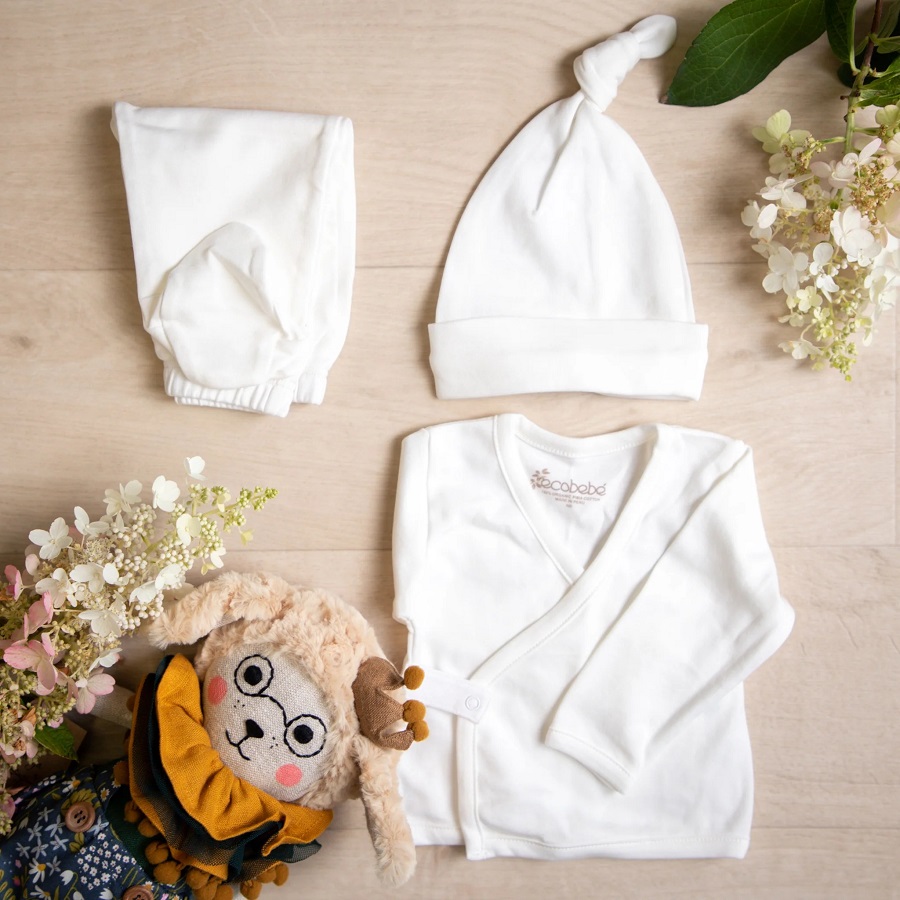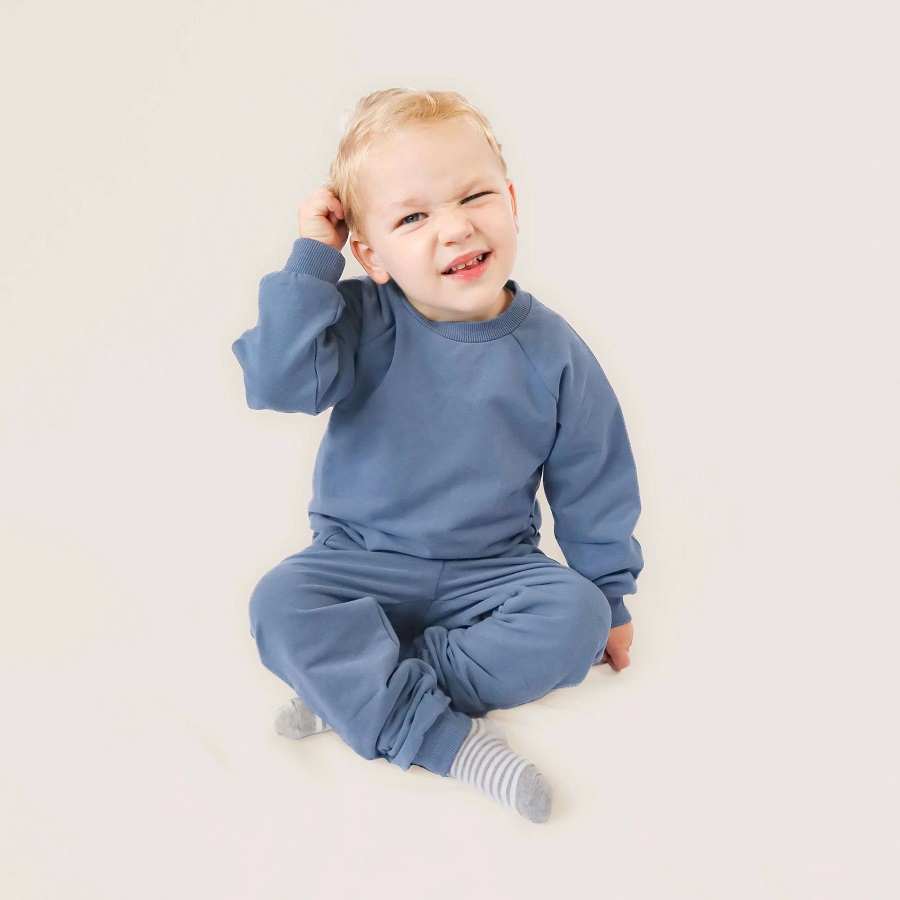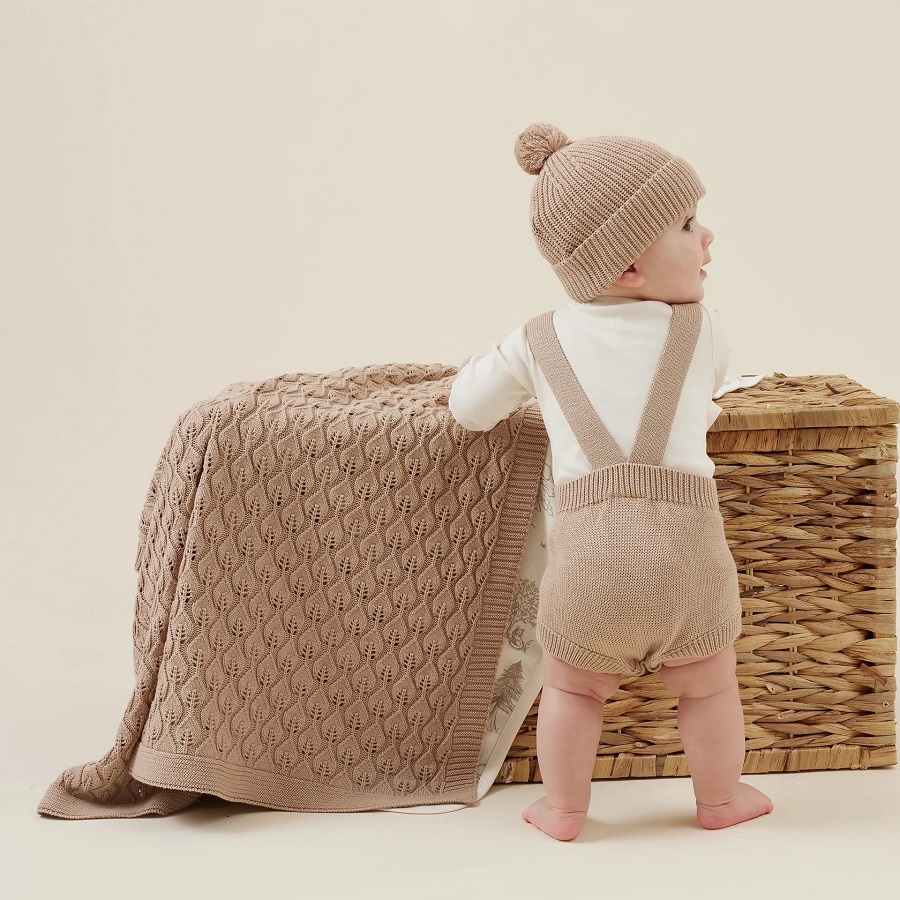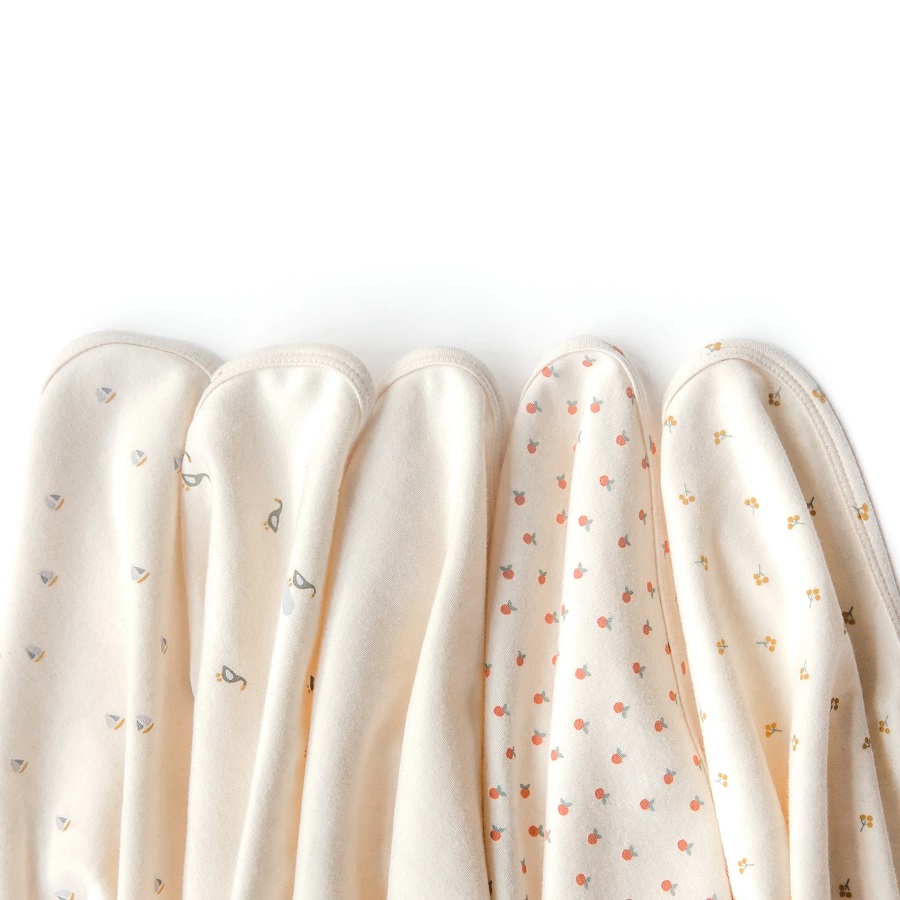The Importance of Organic Cotton for Baby Clothing
Choosing organic cotton for baby clothing is crucial for several reasons. First, babies have delicate skin that’s very sensitive to chemicals. Traditional farming of cotton includes the use of pesticides and synthetic fertilizers that may remain in the fabric even after washing. These residues can cause skin irritations, allergies, or even more serious health issues when in contact with a baby’s skin. Organic cotton, on the other hand, is grown without harmful chemicals, providing a safer alternative for baby apparel.
Another key point is that organic cotton production supports environmental sustainability. Cultivating organic cotton requires less water compared to conventional cotton and promotes healthier soil. By choosing baby clothes made from organic cotton, parents contribute to reducing the negative impact of farming on the environment.
Finally, investing in organic cotton baby clothes aligns with a lifestyle that values ethical choices. Organic cotton farming often ensures fair labor practices and supports communities of farmers working under better conditions. Parents who opt for organic cotton baby wear are not only protecting their infants but are also making a positive social and ecological statement.
In a world where eco-consciousness is gaining momentum, organic cotton stands out as the responsible choice for baby fashion. It’s a testament to a parent’s commitment to their child’s health, the well-being of the planet, and the working conditions of those who produce the clothes.
To ensure you’re getting the best for your baby, it’s important to stay informed about the benefits of organic cotton and support brands that align with these values. In the following sections, we’ll explore the current trends in organic cotton baby fashion, how to identify genuine organic cotton garments, and the leading brands in this niche market.

Current Trends in Organic Cotton Baby Fashion
The demand for organic cotton baby clothes is shaping current trends in the fashion industry. Parents now seek not only comfort and safety but also style and sustainability for their little ones. This movement has given rise to a series of trends in baby fashion.
Contemporary designs now incorporate earth tones and softer palettes, reflecting a return to natural aesthetics. Classic patterns, like stripes and polka dots, are coupled with modern, minimalistic cuts, offering a timeless yet fresh look. More brands are embracing gender-neutral styles too, which appeals to a broader audience and supports the notion of hand-me-downs for sustainability.
Another trend is the inclusion of eco-friendly dyes and printing techniques. Since organic cotton is synonymous with ecological and health-conscious practices, manufacturers are adopting natural dyes, which are safer for babies’ skin and the environment.
Collaborations between well-known designers and organic cotton brands have also emerged, merging the gap between high fashion and sustainable baby wear. These collaborations often result in exclusive collections that make a style statement while retaining all the benefits of organic materials.
Finally, there’s a growing trend towards transparency and traceability. Parents are more informed and inquisitive about the origin of the baby clothes they purchase. Brands are responding by providing detailed information about their supply chain, from the cotton farm to the final garment.
In conclusion, the organic cotton baby clothes trend is defined by a blend of safety, style, sustainability, and social responsibility. For parents who prioritize these values, the current trends offer ample choices to dress their children fashionably without compromising on health or ethics.
How to Identify Genuine Organic Cotton Baby Clothes
When shopping for organic cotton baby clothes, knowing how to spot genuine products is essential. Due to the increasing popularity of organic apparel, some brands may incorrectly label their items as ‘organic’ when they are not fully compliant with organic standards. Here are ways to ensure the baby garments you purchase are truly organic:
- Look for Certifications: Genuine organic cotton clothes will often have certifications from recognized organizations like Global Organic Textile Standard (GOTS) or Organic Content Standard (OCS). These certifications guarantee that the products meet stringent organic requirements from the farming stage to production.
- Check the Labeling: Labels should indicate that the cotton is 100% organic. If it says ‘made with organic cotton,’ it might contain a mix of organic and non-organic fibers. Always read the fine print to understand the composition.
- Research the Brand: Find out more about the brand’s supply chain and commitment to organic practices. Brands dedicated to sustainability will have transparent information about their production processes.
- Examine the Quality: Organic cotton baby clothes are typically softer and of higher quality due to the absence of harsh chemicals. Feel the fabric and check for a natural, soft texture.
- Be Aware of the Price: Organic cotton typically comes at a higher price point because of the ethical and eco-friendly production processes involved. If the price seems too good to be true, it may be an indication that the product isn’t genuinely organic.
By following these steps, parents can make informed decisions and select authentic organic cotton baby clothes that are safe for their children and the planet.

Advantages of Choosing Organic Cotton for Your Baby’s Wardrobe
When you choose organic cotton baby clothes, you give your child and the environment remarkable benefits. Here are key advantages of integrating organic cotton into your baby’s wardrobe:
- Enhanced Skin Protection: A baby’s skin is sensitive. Organic cotton is softer and free from harsh chemicals. This means less chance of irritations and allergic reactions.
- Eco-Friendly Choice: Organic cotton is grown in a way that lessens water use and soil damage. When you buy these clothes, you support sustainable farming practices.
- Long-Term Health Benefits: Wearing organic materials can contribute to overall health. Babies in organic cotton avoid exposure to toxins found in conventional fabrics.
- Durable Clothing: Organic cotton fibers are not broken down by chemicals in the growing process. This results in stronger fabric that lasts longer, even after many washes.
- Comfort for Baby: Clothes made from organic cotton are more breathable. They help regulate your baby’s body temperature and keep them comfortable.
- Support for Ethical Practices: Many organic cotton brands ensure fair labor and wages for their workers. Choosing these clothes means you are part of a positive social change.
- Quality over Quantity: Though sometimes pricier, organic garments tend to have better quality. They offer a wiser investment for parents looking for durable, timeless pieces.
By selecting organic cotton for your baby’s wardrobe, you’re making a choice that benefits many. It’s not just about fashion; it’s a lifestyle choice for a healthier baby and planet.
Top Brands Specializing in Organic Cotton Baby Wear
When looking for organic cotton baby clothes, it’s good to know the top brands that specialize in creating these garments. These brands have built reputations for their commitment to sustainability, quality, and ethical practices. Here we highlight some of the leading names in organic cotton baby wear:
- Burt’s Bees Baby: Known for natural care products, Burt’s Bees also offers a line of organic baby clothes. Their products are GOTS certified, ensuring organic and ethical standards.
- Finn + Emma: This brand stands out for its modern, stylish designs and use of 100% organic cotton. Finn + Emma’s clothes are also GOTS certified and eco-friendly.
- Monica + Andy: They focus on limited-edition prints and a commitment to organic materials. Their organic cotton baby clothes are soft, sustainable, and designed with comfort in mind.
- Under the Nile: With a range of baby clothing, toys, and accessories, Under the Nile is dedicated to 100% organic Egyptian cotton, certified by GOTS.
- Hanna Andersson: Their baby clothes are made from organic Pima cotton, which is incredibly soft and durable. They focus on timeless designs that last through multiple children.
- Touched by Nature: This brand is known for its affordable organic baby clothing options, made with 100% organic cotton and featuring a variety of patterns and colors.
These brands are a great place to start when shopping for organic cotton baby wear. They not only offer quality apparel but also align with the values of eco-conscious parenting. Remember to look for certifications and research the brand to ensure their sustainability claims stand up. These brands offer peace of mind, knowing that the clothes you’re choosing for your baby are gentle on their skin and kind to the environment.

Caring for Organic Cotton Baby Garments
Looking after your baby’s organic cotton clothes properly can make them last longer. To keep these garments in top condition, follow these simple care tips:
- Read the Care Label: Start by reading the care label for specific washing instructions. Organic cotton often needs gentle care.
- Use Mild Detergents: Choose eco-friendly, mild detergents that are suitable for organic fabrics. Strong chemicals can damage the fibers and the environment.
- Wash in Cold Water: Opt for cold water washes. This keeps the fabric’s integrity and conserves energy.
- Avoid Bleach and Stain Removers: Bleach can weaken organic cotton fibers, and harsh stain removers may contain chemicals. Instead, use natural stain treatment methods.
- Line Dry When Possible: Sunlight has natural bleaching properties. Air-drying is best for the fabric and saves energy. If you must use a dryer, choose a low-heat setting.
- Gentle Ironing: If ironing is needed, do it on a low heat setting. High heat can harm the organic cotton fibers.
- Store Properly: Keep organic cotton baby clothes in a cool, dry place away from direct sunlight. This prevents fading and fabric decay.
- Mend Promptly: If you notice a tear, fix it quickly. This will prevent it from getting bigger and extends the garment’s life.
By following these steps, you’ll ensure that your organic cotton baby clothes stay soft, comfortable, and durable for a long time. It’s a simple way to sustain the value you found in choosing organic for your baby’s wardrobe.
The Future of Baby Fashion: Sustainability and Organic Materials
The future of baby fashion is moving towards more sustainable practices. Brands are adopting organic materials, like organic cotton, to set new standards in the industry. Parents are now more conscious about their purchases, looking for eco-friendly options for their children. This is driving brands to innovate and provide organic cotton baby clothes that meet ethical and environmental standards.
Sustainable innovation is key in baby fashion’s future. This includes using recycled materials and creating biodegradable packaging. As technology improves, we will see more eco-friendly fabrics and efficient manufacturing processes. Organic cotton remains at the forefront due to its natural benefits and lower impact on the environment.
Also, the future holds more emphasis on the clothing lifecycles. Parents are sharing and recycling baby clothes. There is a growing popularity of second-hand markets and clothing swaps. This helps to reduce waste and supports a circular economy.
In conclusion, sustainable practices and organic materials, like organic cotton, are shaping the future of baby fashion. Parents and brands are partnering to create a healthier world for the next generation. By choosing organic and sustainable options, we protect our children’s skin and the planet.
Where to Shop for Organic Cotton Baby Clothes
As parents embrace the sustainable fashion movement for their little ones, knowing where to shop for organic cotton baby clothes becomes vital. These are the go-to venues for high-quality, eco-friendly clothing:
- Local Boutique Stores: Small local shops often stock unique and ethically-made items. It’s a good way to see and feel the quality firsthand.
- Specialized Online Retailers: Online stores dedicated to eco-friendly products offer a vast selection of organic cotton baby clothes. They often provide detailed brand and product information.
- Farmers Markets and Eco-Fairs: Events focused on sustainability sometimes feature organic baby wear. They’re great for finding local and handmade clothing.
- Directly from Brands: Buying directly from the brands’ websites ensures authenticity and sometimes gives you access to exclusive online collections.
- Consignment Stores: For budget-conscious shopping, consignment stores can be a treasure trove for gently used organic baby clothes.
- Social Media Marketplaces: Parenting groups on platforms like Facebook often have members selling or swapping organic baby wear.
Remember to check for organic certifications and fabric content when shopping, ensuring you’re getting genuine organic cotton. Be ready to pay a premium for the quality and ethics behind organic baby clothes. Ultimately, by choosing organic, you foster a better environment and healthier future for your child.
